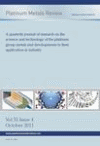-
oa Sliding Noble Metal Contacts
Contact Resistance and Wear Characteristics of Some New Palladium Alloy Slidewires
- Source: Platinum Metals Review, Volume 12, Issue 4, Oct 1968, p. 122 - 128
-
- 01 Jan 1968
Abstract
When, as in many low torque potentiometers, contact pressures must not exceed a few grams the use of noble metals for both resistance wire and wiping contact becomes almost essential. As the factors that determine the electrical and mechanical behaviour of such low load sliding contacts have not yet been established, wiper/slidewire combinations are still selected on an empirical basis. This paper, based on a lecture recently delivered to the Fourth International Research Symposium on Electrical Contact Phenomena at Swansea, describes some results obtained on an apparatus in which the abrasion resistance and frictional characteristics of precision resistance alloys can be assessed in an objective manner at very low contact loads. Under such conditions metal is transferred from wiper to resistance alloy and the efficiency of this transfer process determines the electrical behaviour of these sliding contacts.


